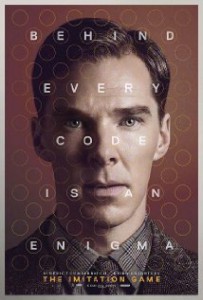8.5/10
The best way to prevent innocent deaths during World War II is to decode the German Enigma machine that they use to communicate attack strategies. “The Imitation Game” tells the real life story of of mathematician, cryptanalyst and war hero Alan Turing (Benedict Cumberbatch) and his team of mathematicians fighting in a race against time during the world’s biggest war. What i loved about this film is that it told three different stories at the same time. The film starts in the future of 1952 during a home invasion burglary of Turing. What follows is his arrest for public indecency. A charge that would expose a haunting secret for Alan when his past becomes clear to the authorities. In the span of flashbacks during the exposition in the police department, we learn about his days as a child at an all boys school to his time cracking Enigma. The way the story is told in this film is among the very best with not only communicating above intelligence information, but with building a character backstory for it’s main character. Turing is a man who hides a lot during a time when the world wasn’t acceptable of certain things. Those secrets actually create a pleasant surprise for this film that i didn’t see coming. Going in, i felt that this film was an autobiographical film about ending the war, but the film’s three big twists during it’s storytelling changes anything you could expect by film’s end. I do kind of wish the twists were a little more spread out over the course of the 1 hour and 48 minute run time, but i can’t critique it too much as the movie is a real life story. It’s also why i didn’t fault much for an ending that is tragically hollow. This all happened, so to be disappointed with some events would only be preaching to an already 60 year old choir. My only legitimate problem with the film is a person peeve that i always notice when i watch a film with a time span like this one. The movie takes place over twelve years, but Turing nor any of his counterparts ever age, or show any signs of stress reflection despite holding the lives of millions in their hands. From the start of the film in 1940 to the final documented year of 1952, it seriously doesn’t look like Turing ages five minutes let alone twelve years. Getting past this personal nitpick, i found the film to be thoroughly enjoyable with not only a marvelous cast, but an educative briefing on code cracking. The performance mentions begin and end with the great Benedict Cumberbatch. What a year he has already had, but he certainly saved the best for last in this film. The movie’s success rests on Cumberbatch’s shoulders, and i don’t feel like i am even slightly embellishing expecting him to receive an Oscar nomination for his work. Once we start breaking down the walls of his tortured history, we understand what makes Alan tick. Some of that “Sherlock” charm comes out in this film, and it’s easy to understand why he will be an Oscar nominee for years to come. Another big scene stealer comes in the form of one of Hollywood’s biggest kept secrets, Matthew Goode. I have been a fan of Goode’s for a long time with great roles in “Watchmen”, and “Stoker”, and this film is no exception. His endless charisma moves some scenes along that would otherwise be considered dry. He gives a humor flavoring to “The Imitation Game” that is welcome during it’s darkest scenes. The wardrobe and props department also put in some long hours on this film. The overall look of the film jumps you into a time machine for some of the best detailing of World War II that i have ever seen. It was cool to see perhaps some of the first computers ever developed being used to aid and end the war. Perhaps the film’s strongest peak comes from the terrifying truth this team faces after the cracking. That is when the twists kick in, and “The Imitation Game” goes from an intelligent war piece to a harrowing reminder of how far we have come in socialogical reflections. Consider the code cracked. “The Imitation Game” is a late year winner that brings every emotion out of it’s audience.
